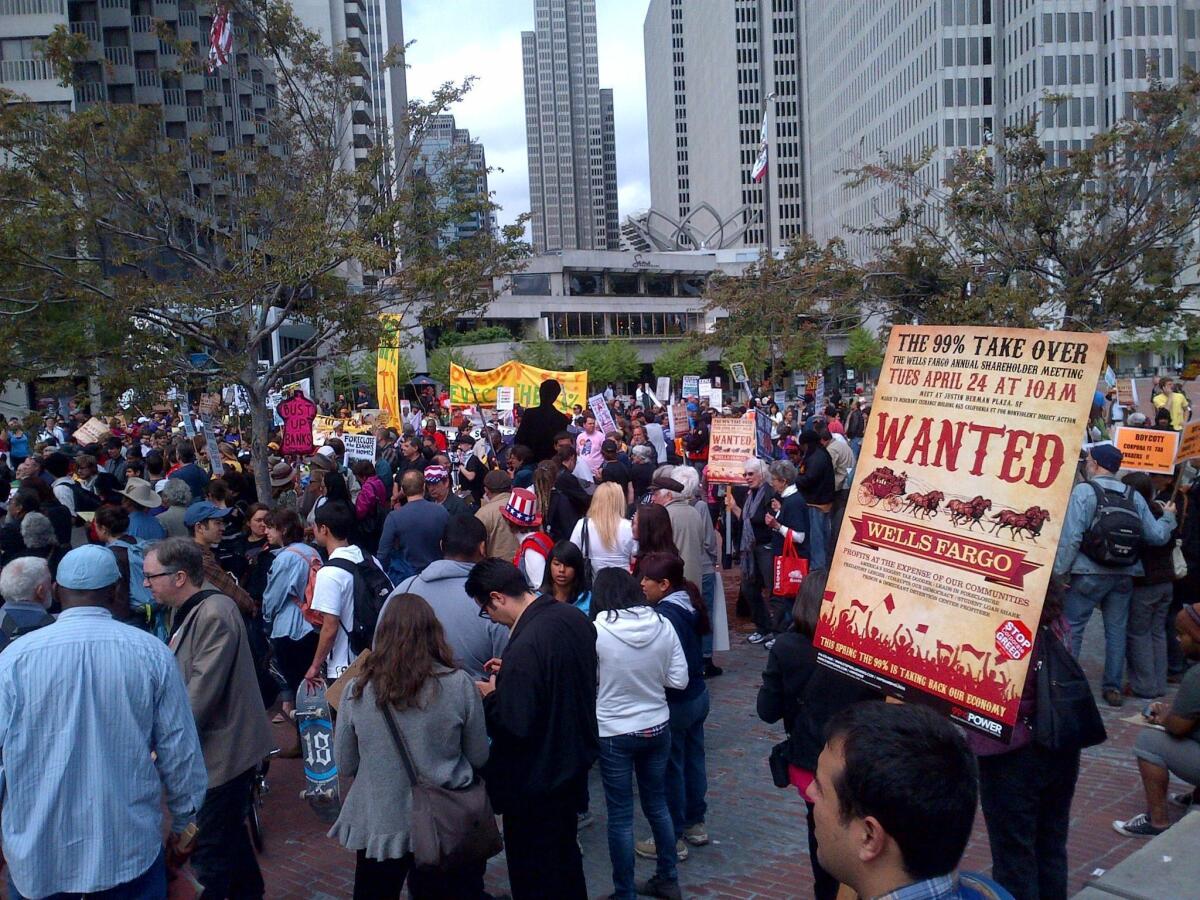Wells Fargo moves annual meeting to Texas, but protesters follow

- Share via
You can move your shareholder meeting out of California, but you can’t stop protesters from following.
Joining ordinary Wells Fargo shareholders, demonstrators planned to air their grievances Tuesday in San Antonio, site of this year’s annual meeting. Some protesters purchased a share of stock, entitling them to enter the meeting and speak for two minutes.
The issues included Wells Fargo’s foreclosure practices, its ties to private prison companies, and complaints that front-line branch employees were driven to unethical behavior by the bank’s never-ending demands to increase sales of accounts and add-ons.
Ancel Martinez, a Wells Fargo spokesman, said bank Chief Executive John Stumpf would address complaints raised at the meeting, held at a Hyatt Regency resort.
At the 2012 shareholder meeting, protests of Wells’ foreclosure practices nearly paralyzed downtown San Francisco, where the bank is based. Inside a meeting hall, Stumpf called off the gathering after just 45 minutes without a formal question-and-answer session.
The bank moved last year’s meeting to Salt Lake City, where it was again disrupted by protesters with complaints that Wells Fargo was doing too little to modify troubled loans.
Among the demonstrators this year were representatives of the California Reinvestment Coalition in San Francisco, an umbrella group for more than 200 nonprofits seeking to move minorities into the financial mainstream.
The group has accused Wells Fargo of unfairly denying mortgage modifications to minority borrowers. It sponsored a shareholder resolution last year demanding an independent audit of Wells Fargo’s mortgage customer service and foreclosure practices.
The resolution was voted down by the shareholders, but complaints continued to be heard from troubled borrowers about their treatment by the bank.
Roxana Zamora of Whittier, a single mother raising two teenagers, said she acquiesced to several major requests from the bank to no avail as she battled for years to obtain easier loan terms after a series of personal setbacks.
Zamora, who is fighting an aggressive cancer, said she stayed on her estranged husband’s insurance policy until Wells Fargo insisted she divorce him in order to be considered for a loan modification.
She said she spent $4,500 to get a divorce decree while losing the insurance coverage. Later on, she said, she filed for bankruptcy protection at a cost of $3,500 after a bank executive told her that it was a necessary step to get her loan terms eased.
“I did all this and still they deny me,” she said in a phone interview Monday from Texas. The foreclosure auction for her home is scheduled for May 20.
[Updated 11:21 a.m. PDT April 29: Zamora’s tangled case is complicated further because her loan was sold to Fannie Mae, the government-backed home finance company, which doesn’t permit the principal to be reduced on troubled mortgages.
The bank has put in “six years of effort to resolve this,” Tom Goyda, a Wells Fargo Home Loan spokesman, said of Zamora’s case. “We had team members at the annual meeting to sit down with people like Ms. Zamora and try to find an option to avoid foreclosure, if that can be done.”]
The protests over Wells Fargo’s retail sales practices follow a Times investigation last year into complaints by numerous employees that tellers and bankers often felt so pressured to meet sales quotas that they cheated by foisting unwanted financial services on customers.
Brigid Flaherty, a New York-based organizer for a union-supported group, the Committee for Better Banks, said a shareholder would try to present Stumpf with a petition signed by 4,000 former and current Wells Fargo employees demanding an end to the sales quotas.
“It’s all about fees, fees, fees,” said one of the signers, Julia Miller, a former Wells Fargo branch manager from Macungie, Pa. She said her higher-ups at the bank had insisted on unachievable sales goals while reprimanding her if she allowed employees to earn overtime.
Miller, 49, said she didn’t have the money to travel to San Antonio. She said she developed severe nausea, headaches and high blood pressure from the stress, took a disability leave as a consequence, and later was fired by the bank when she returned to work.
In court filings, Wells Fargo has denied allegations of wrongdoing in a federal lawsuit Miller filed last month in Allentown, Pa., accusing the bank of retaliatory firing in violation of the Family and Medical Leave Act.
More to Read
Inside the business of entertainment
The Wide Shot brings you news, analysis and insights on everything from streaming wars to production — and what it all means for the future.
You may occasionally receive promotional content from the Los Angeles Times.







